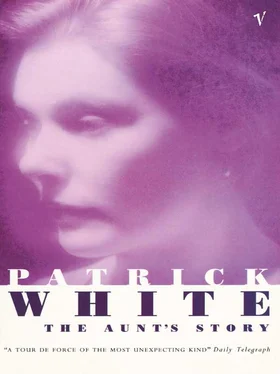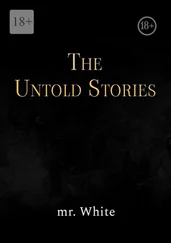The flat, pale kindness of Violet Adams, or Simpson, was like an ointment. It soothed. Theodora Goodman thought about her own letter, which she had written in reply, and which was also kind and flat, flat as its envelope, and yet she was neither kind nor flat. She wondered a little about Violet Adams waltzing with Charlie Simpson beside the great river she had once described in flood. The descriptive letters never did describe. And the writing tables of women, the useless women, must be littered with these lies. The polite, kind letters written in the code of friendship.
‘I do like my tea,’ Mrs Goodman sighed.
If Mrs Goodman softened, it was in moments of small nostalgia such as these, for her own physical well being. Mother is very physical, Theodora thought. She watched the rings encrusting Mrs Goodman’s tea-cup. They were the same rings. And the face was the same. In age it had not softened. It had been carved a little deeper, like a stone that the artist could not bear to leave, as if the next touch might give it immortality, not destroy its soul. So Mrs Goodman sat, perfect within her limits, but, like marble, she did not expand.
‘Tea,’ she sighed, ‘is a most civilized drink.’
And then, ‘I wonder what they are up to. At Meroã. That brewer man with the watch and chain.’
Because the stomach of Mr MacKenzie had rustled with gold, and a greenstone tomahawk, and a ruby star, as Mr Parrott stood with the sun in his eyes on the yellow steps at Meroã and passed him off.
‘Theo, this is Mr MacKenzie, who is going to buy the house,’ Mr Parrott said.
‘Miss Goodman, eh? Heard about you. You and the missus were schoolmates. So Mrs MacKenzie says.’
‘We were at school together, yes,’ Theodora replied.
But Mr MacKenzie was on his way to the yard, to see where he could stable motor cars. Because, of course, he had bought a motor car, in which his wife used to sit looking expensive, with a little detachable parasol.
So that Theodora did not expect there was much more to be said for Meroã. It was swallowed by Mr MacKenzie, and the mouths of the people at the general sale, the red, round, and greedy, or the brown, hatchety, suspicious faces, that gobbled or snapped at LOTS. Because objects had lost their identity and become numbers. It was doubtful whether, even with the ticket soaked off, identity would ever be restored.
When her knees began to tremble, Theodora said, ‘I was not born, unfortunately, with mahogany legs.’
‘Sit down, Theo. There’s no need to stand about. So sit down,’ said Frank Parrott.
He spoke with the accent of kindness with which people address the surface of one another’s lives.
‘You’ll get a tidy price for this stuff of yours,’ he said. ‘Cockies and storekeepers like to lay their hands on something good. If they think it’s got class, they’re prepared to pay.’
But Frank looked sideways at Theodora. It was becoming a habit, as if he blamed her for his own guilt, or else her ugliness, or both. Theodora accepted this approach. There were no ripples on the pool. It was flat and smooth. My brother-in-law, Frank Parrott, she said. There were moments when Theodora was as smooth as glass.
‘Yes,’ said Mrs Goodman, between mouthfuls, ‘I wonder what they are up to at Meroã.’
She exhaled, as if the tea she had tasted had been bitter. Her eyes rounded in the stream, which might give up, she hoped, some vision of vulgarity.
‘But there you are,’ she said.
‘What is?’ Theodora asked.
The straw from the packing cases still twitched at her skirt. The sea of pines swelled, hinting at some odyssey from which there was no return.
‘It is just a manner of speaking,’ Mrs Goodman exclaimed. ‘Really, Theodora, how tiresome you can be.’
But Mother had not embarked. Her world had always been enclosed by walls, her Ithaca, and here she would have kept the suitors at bay, not through love and patience, but with suitable conversation and a stick. Mother would have said in the end: Oh, here you are, and about time too, I was bored. What, you have seen witches and killed giants? Ah, but Ianthe, a good cook, though a horrid girl, has beaten an octopus a hundred and forty times on a stone and simmered it for eight hours in wine, and I have offered a calf to Aphrodite if she will produce six yards of purple out of the air.
Instead of all this, the more carnal Mrs Goodman said, ‘I shall read. I shall read this library book that has been forced on me by Connie Ewart. Though why? Why Connie thinks I should read the latest dirty book.’
‘It is not necessary, Mother,’ said Theodora. ‘There are plenty of clean ones in the house.’
‘No. I shall read it. I shall read the book that Connie so inexcusably brought. It is dirty. It is quite foul. But it is interesting as a commentary on modern life.’
Mrs Goodman read many books. This was her life, with tea, and bezique, and conversation. Her years piled up, finically, like matchsticks on the knottier logs of time, while outside the novels from the library, history was telling a story, only faintly at first, but growing in importance and alarm, until they had begun to put it in the morning paper, in serial form.
‘What do you think?’ people asked. ‘Will it be bad? What does Theodora think?’
‘Why should Theodora think?’ said Mrs Goodman. ‘Theodora is only a girl. She has had no experience. My solicitor tells me it is most serious. I remember once seeing the Kaiser in Berlin. Theodora, I asked you to leave the window open, and you shut it.’ ‘You asked me to shut it, Mother.’
‘You always misinterpret what I say. Yes, as I was saying. In Berlin. And I shuddered then. Ah, but you don’t know Berlin. It is full of chariots with rearing horses. And the men shave their heads.’
Now, for Mrs Goodman, the chariots moved, the horses reared higher, out of the moment in which they had been sculptured, the shaven heads were set in motion, as she sat in her room remembering her personal distaste. It was always largely personal. The horrors of war touched her in theory. She knew what expression to wear on her face. But it was for something that would remain outside her experience, in Europe, where her age and income precluded her admission. She was glad. I am old, she said, as if she had bought her way out of any further responsibility.
But Theodora walked in the streets. There were flags in the streets. There was crying. There was crying on the wharves, and in the upper rooms, where the bed ached, under the electric light which had been forgotten. Its bright bulb made little headway against the general shapelessness that was taking possession.
Once under a lamp-post there was a drunk sitting, whose face was a green lozenge, who called to Theodora from the kerb, and said, ‘You are walkin’, sis, as if you didn’t expect no end.’
‘I was thinking,’ Theodora answered from the darkness.
‘That is the trouble,’ said the man, ‘if you’ll excuse me, missus, is it? Thinkin’ leads to all this perpendicular emotion. You must listen to your belly and the soles of your feet. That’s what I been doin’, sis. An’ my bloody stomach tells me there’ll be a bloody end.’
‘I hope you are right,’ said Theodora Goodman.
‘It stands ter nature. You can fill a man up, sis. Up to a point. But ’e’ll spew it out. An’ then ’e’ll be right as rain.’
She began to be tired of the man’s face, and not altogether convinced by philosophy. She began to move, because she did not know what ėlse to do.
‘You goin’?’ he said. ‘Thought we was havin’ a talk.’
‘Good night,’ she called. ‘I shall think about what you said.’
‘Cripes, no,’ said the man. ‘It don’t bear it. Buy yourself a drink on Bert Kelly.’
Читать дальше












